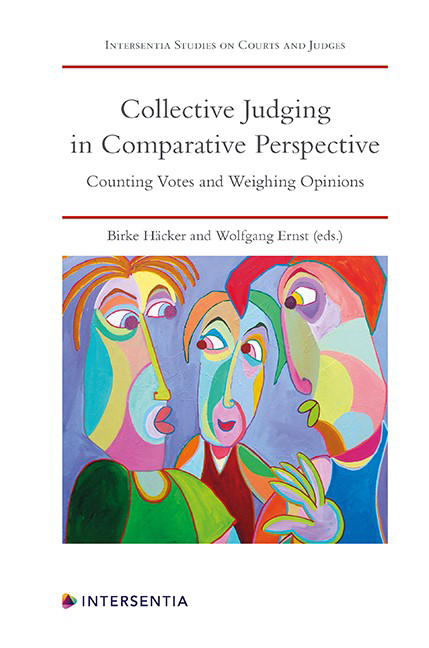Book contents
- Frontmatter
- Preface
- Contents
- List of Cases
- List of Contributors
- PART I DESIGNING COLLEGIATE COURTS’DECISION-MAKING PROCESSES
- PART II COLLEGIATE COURTS IN THE COMMON LAW TRADITION
- PART III COLLEGIATE COURTS IN THE EUROPEAN CIVIL LAW TRADITION
- PART IV COLLEGIATE COURTS IN A NON-EUROPEAN CIVIL LAW JURISDICTION: THE CASE OF JAPAN
- PART V SUPRANATIONAL AND INTERNATIONAL COLLEGIATE COURTS
- PART VI VOICES FROM THE AUDIENCE AND CLOSING REMARKS
- About the Editors
Chapter 20 - Concluding Remarks
Published online by Cambridge University Press: 09 February 2021
- Frontmatter
- Preface
- Contents
- List of Cases
- List of Contributors
- PART I DESIGNING COLLEGIATE COURTS’DECISION-MAKING PROCESSES
- PART II COLLEGIATE COURTS IN THE COMMON LAW TRADITION
- PART III COLLEGIATE COURTS IN THE EUROPEAN CIVIL LAW TRADITION
- PART IV COLLEGIATE COURTS IN A NON-EUROPEAN CIVIL LAW JURISDICTION: THE CASE OF JAPAN
- PART V SUPRANATIONAL AND INTERNATIONAL COLLEGIATE COURTS
- PART VI VOICES FROM THE AUDIENCE AND CLOSING REMARKS
- About the Editors
Summary
When we first conceived the conference documented in this volume, we started with quite a narrow focus. We wanted to compare ‘group choice’ mechanisms employed by a selection of important courts around the world. We thereby hoped to learn more about voting processes and their formal frameworks, and possibly to explore the equivalent in judiciaries where such processes are not a formal part of the collegiate decision-making process. In short, we were primarily after the ‘rules of voting’ in collegiate courts. We did indeed learn much about such processes. Yet the most enlightening product of the conference was arguably a broadening of our perspective: We began to understand better the interconnectedness of a range of different elements, all of which impact the quality of collegiate decision-making in a much more direct or significant way than we had anticipated.
The size of the collegiate body, for instance, appears to be a decisive factor within the decision-making process, in that it is liable either to encourage or to inhibit a free exchange of views. The larger the number of judges involved, the more formal their contributions tend to become. Very large benches also tend to emphasise the role of the presiding judge and the rapporteur, right up to a point where all other members of the panel risk losing the chance to influence the decision-making process effectively. Though a smaller body does not necessarily guarantee a free exchange of arguments, it seems to us that ‘going big’ is almost certainly detrimental to a culture of substantive debate. The practice of some judiciaries to compose larger benches for cases deemed to be a greater ‘importance’ than others may therefore actually have an adverse effect on the quality of intra-court exchanges.
One feature of collegiate decision-making which we had thitherto not sufficiently appreciated was the fact that ‘trilaterality’ of proceedings can make for intellectually highly productive interactions: The judges of a bench interact not only with one another, but also with both of the parties. When one compares appellate and supreme courts of various jurisdictions, one finds a striking difference regarding the involvement of parties and their lawyers in the exchange of legal arguments which set the stage for the ultimate decisionmaking.
- Type
- Chapter
- Information
- Collective Judging in Comparative PerspectiveCounting Votes and Weighing Opinions, pp. 339 - 342Publisher: IntersentiaPrint publication year: 2020



